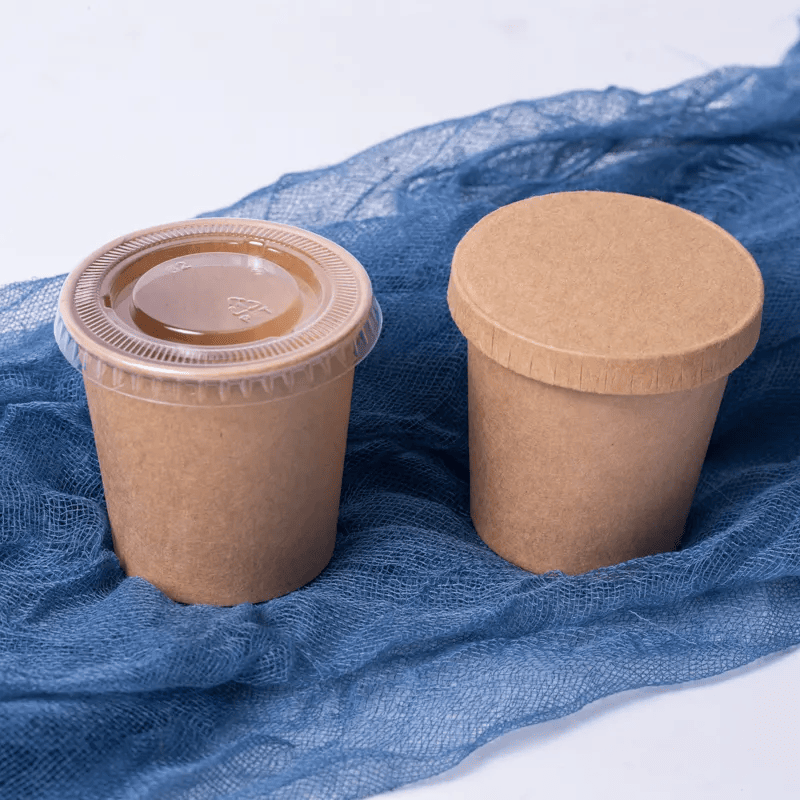Portion Cup Disposable Sauce Cup
Compostable Portion Cups with Lids
These are small containers, often used for condiments, sauces, or samples, made from materials that can decompose in a compost setting, leaving no toxic residue.
Materials Used of compostable portion cups
PLA (Polylactic Acid): Made from fermented plant starch (usually corn), it looks like plastic but is compostable.
Bagasse: A byproduct from sugarcane processing, it's molded into various shapes including portion cups.
Wheat Straw: This agricultural waste product is processed to create sturdy, compostable containers.
Benefits of compostable portion cups
Environmentally Friendly: Decomposes faster than regular plastic, reducing landfill waste.
Reduces Carbon Footprint: Often made from renewable resources, resulting in fewer greenhouse gas emissions during production.
Safe: Most compostable products are BPA-free and don't leach harmful chemicals.
Consumer Appeal: Many consumers prefer businesses that adopt eco-friendly practices.
What is a portion cup?
A portion cup is a small container designed to hold and serve individual portions of condiments, sauces, dips, dressings, or even small snacks. They're commonly used in restaurants, cafes, takeout joints, and catered events to provide a specific amount of a product, ensuring consistent serving sizes and minimizing waste.
Paper Portion Cups Vs Plastic Portion Cups
1. Material Source
Paper: Derived primarily from wood pulp. Renewable, especially if sourced from sustainably managed forests.
Plastic: Produced from petrochemicals, derived from non-renewable fossil fuels.
2. Environmental Impact
Paper:
Biodegradability: Generally decomposes faster than plastic.
Recyclability: Can be recycled if uncontaminated, though the coating might pose challenges.
Renewability: Made from trees, a renewable resource.
Plastic:
Biodegradability: Takes hundreds to thousands of years to decompose.
Recyclability: Some plastics can be recycled, though many end up in landfills.
Carbon Footprint: Producing plastic typically has a higher carbon footprint than paper.
3. Durability & Functionality
Paper:
Generally less durable than plastic.
Might become soggy with certain liquids, especially if uncoated.
Plastic:
Highly durable and leak-proof.
Suitable for a wide range of condiments, from watery to thick.
4. Cost
Paper: Might be more expensive than plastic, especially if made from sustainable sources or coated.
Plastic: Typically cheaper to produce and purchase in bulk.
5. Health Concerns
Paper: Generally perceived as safer. No potential for leaching chemicals, especially when coated with food-safe materials.
Plastic: Some plastics might leach chemicals, especially when exposed to heat or acidic foods.
6. Customization & Appearance
Paper: Can be easily printed on, offering branding opportunities. Typically has a more natural, eco-friendly appearance.
Plastic: Can be transparent, allowing the content to be visible, or can be colored. Printing might require specific inks.
7. Storage & Transport
Paper: Lighter than plastic, resulting in potentially lower transportation costs. Might take up more space due to reduced stackability.
Plastic: Highly stackable, which can save space during transport.
What is the difference between a paper portion cup, souffle cup?
Paper Portion Cup:
Primarily designed to hold and serve condiments, sauces, and dips.
Found frequently in takeout joints, restaurants, and events.
Typically made of paper, often with a wax or plastic lining to prevent seepage.
Soufflé Cup:
Originally designed for baking mini soufflés or desserts.
Over time, they've become synonymous with portion cups and are often used interchangeably in many settings to serve condiments.
Can be made of paper, but they're also available in plastic and even aluminum.
Where to buy portion cups?-ColinPak
ColinPak is a leading exporter of food packaging made from FSC certified raw materials, ensuring that our products are responsibly sourced and meet the highest standards of sustainability.
We have our own factory in Ningbo China: Filinpack.If you need to buy coffee cup sleeve, you can contact us ColinPak in time.


